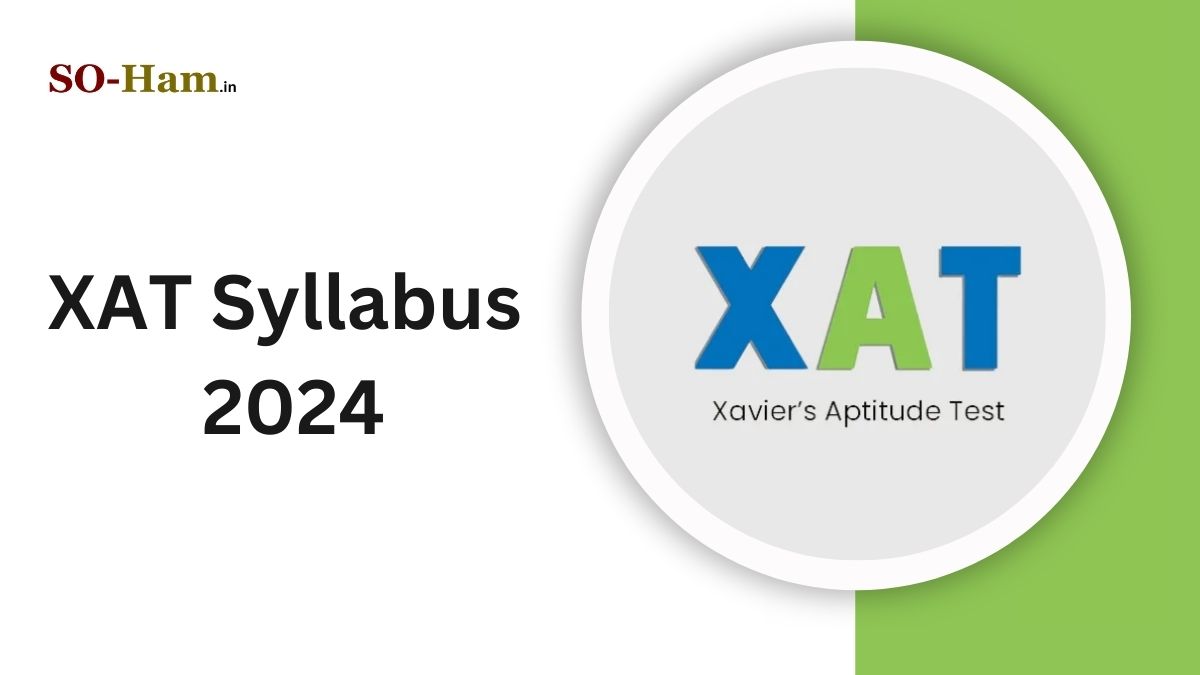The Xavier Aptitude Test (XAT), conducted by XLRI Jamshedpur on behalf of XAMI, is one of the most sought-after MBA entrance exams in India. The XAT Syllabus 2024 includes key sections like Verbal Ability & Logical Reasoning, Decision Making, Quantitative Aptitude & Data Interpretation, General Knowledge, and Analytical Essay Writing.
This article provides a detailed breakdown of the XAT syllabus, exam pattern, and strategies to help you excel.

XAT Exam Pattern 2024
Understanding the XAT exam pattern is crucial for aspirants. Here’s the updated structure:
| Part | Subject | Duration | Number of Questions |
|---|---|---|---|
| Part 1 | Verbal Ability & Logical Reasoning | 175 minutes | ~26 |
| Decision Making | ~22 | ||
| Part 2 | Quantitative Aptitude & Data Interpretation | ~28 | |
| Part 3 | General Knowledge | 30 minutes | ~25 |
| Analytical Essay Writing | Essay Writing | 1 essay |
Marking Scheme:
- Each question carries 1 mark.
- Negative marking of 0.25 marks for incorrect answers.
- After 8 unattempted questions, a penalty of 0.10 marks per question applies (except in General Knowledge).
Section-Wise XAT Syllabus 2024
1. Quantitative Aptitude & Data Interpretation (QA & DI)
This section assesses mathematical ability and data analysis skills.
Key Topics:
- Percentages, Ratio & Proportion, Averages
- Time, Speed & Distance, Work & Time
- Profit & Loss, Simple & Compound Interest
- Geometry, Algebra, Mensuration
- Probability, Logarithms, Trigonometry
- Data Interpretation: Pie Charts, Bar Graphs, Line Graphs
2. Verbal Ability & Logical Reasoning (VA & LR)
This section focuses on language skills, reasoning, and comprehension.
Key Topics:
- Reading Comprehension, Sentence Correction
- Synonyms/Antonyms, Fill in the Blanks
- Jumbled Paragraphs, Paragraph Completion
- Word Usage, Contextual Vocabulary
- Logical Reasoning, Analytical Reasoning
3. Decision Making (DM)
A unique section in XAT, this evaluates problem-solving and decision-making abilities in complex scenarios.
Key Topics:
- Caselets, Data Arrangement
- Analytical Reasoning, Grouping & Conditions
- Decision-Based Situations
4. General Knowledge (GK)
Tests static and current awareness.
Key Topics:
- Business, Politics, Economy
- History, Geography, Constitution of India
- Awards, Personalities, Current Affairs
5. Analytical Essay Writing (AEW)
Requires candidates to write a well-structured essay based on a given topic, demonstrating clarity, reasoning, and coherence.
Preparation Tips for XAT 2024
- Understand the Syllabus: Review section-wise topics and prioritize based on weightage.
- Create a Study Plan: Allocate time for each section, focusing on weaker areas.
- Use Quality Resources: Refer to recommended books, sample papers, and mock tests.
- Practice Regularly: Solve past papers to improve speed, accuracy, and time management.
- Revise Consistently: Revise key concepts and formulas to retain them effectively.
FAQs
1. When is the XAT 2024 exam scheduled?
The XAT 2024 exam is scheduled for early January 2024.
2. What are the sections in XAT 2024?
The XAT exam includes Verbal Ability & Logical Reasoning, Decision Making, Quantitative Aptitude & Data Interpretation, General Knowledge, and Analytical Essay Writing.
3. Is there negative marking in XAT?
Yes, there is a penalty of 0.25 marks for incorrect answers and 0.10 marks for unattempted questions beyond eight.
4. How should I prepare for the Decision Making section?
Focus on solving caselets and practice analyzing scenarios to make logical decisions.
5. What are the key topics for Quantitative Aptitude?
Key topics include Percentages, Ratio & Proportion, Time & Work, Geometry, and Data Interpretation.
6. Is the General Knowledge section scored in the overall percentile?
No, the General Knowledge section is not included in the overall percentile calculation.
7. What books are recommended for XAT preparation?
Books like Quantitative Aptitude by Arun Sharma and Verbal Ability by RS Aggarwal are recommended.
8. How is the Analytical Essay Writing section evaluated?
Essays are evaluated based on clarity, coherence, logical reasoning, and language skills.
Click here to know more.
